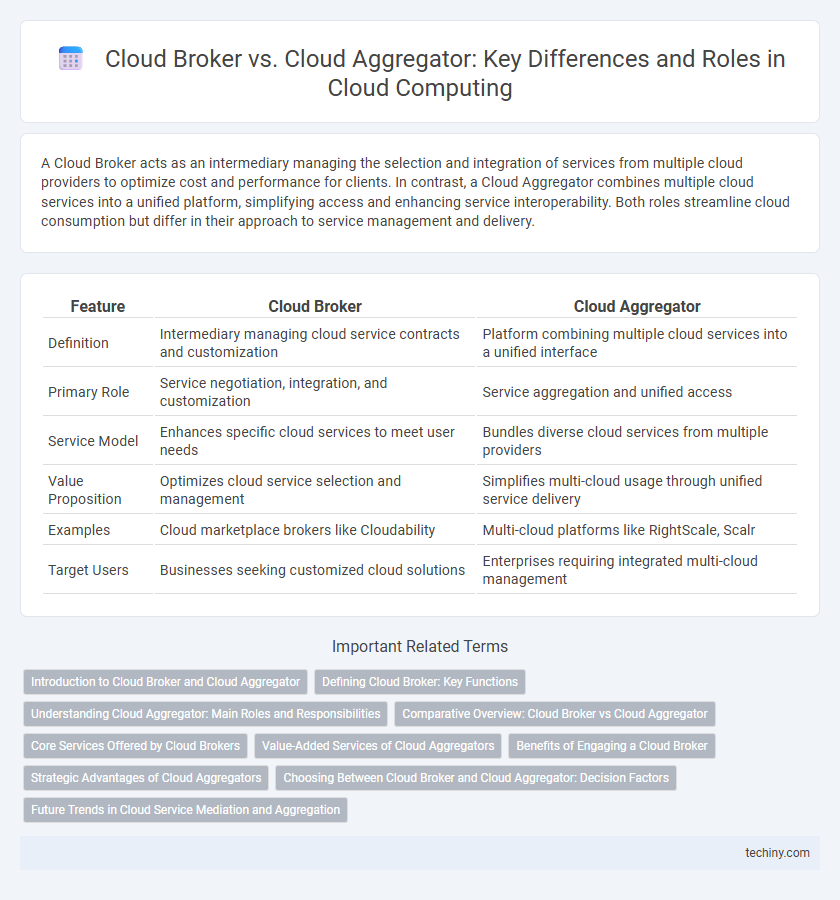A Cloud Broker acts as an intermediary managing the selection and integration of services from multiple cloud providers to optimize cost and performance for clients. In contrast, a Cloud Aggregator combines multiple cloud services into a unified platform, simplifying access and enhancing service interoperability. Both roles streamline cloud consumption but differ in their approach to service management and delivery.
Table of Comparison
| Feature | Cloud Broker | Cloud Aggregator |
|---|---|---|
| Definition | Intermediary managing cloud service contracts and customization | Platform combining multiple cloud services into a unified interface |
| Primary Role | Service negotiation, integration, and customization | Service aggregation and unified access |
| Service Model | Enhances specific cloud services to meet user needs | Bundles diverse cloud services from multiple providers |
| Value Proposition | Optimizes cloud service selection and management | Simplifies multi-cloud usage through unified service delivery |
| Examples | Cloud marketplace brokers like Cloudability | Multi-cloud platforms like RightScale, Scalr |
| Target Users | Businesses seeking customized cloud solutions | Enterprises requiring integrated multi-cloud management |
Introduction to Cloud Broker and Cloud Aggregator
Cloud brokers act as intermediaries that help businesses select and manage multiple cloud services by optimizing cost, performance, and compliance. Cloud aggregators, on the other hand, integrate services from various cloud providers into a single platform, enabling seamless access and simplified management for end-users. Both play crucial roles in enhancing cloud service flexibility and efficiency within multi-cloud environments.
Defining Cloud Broker: Key Functions
A cloud broker acts as an intermediary between cloud service consumers and providers, optimizing service selection by aggregating multiple cloud offerings into a unified platform. Key functions include service intermediation to enhance individual cloud services, service aggregation to combine different services into a new one, and service arbitrage, enabling dynamic switching between providers to meet cost or performance requirements. This role ensures enterprises can efficiently discover, negotiate, and manage diverse cloud resources, driving cost savings and operational agility.
Understanding Cloud Aggregator: Main Roles and Responsibilities
A Cloud Aggregator integrates multiple cloud services and resources into a unified platform to simplify management and improve user experience. Key responsibilities include consolidating diverse cloud offerings, ensuring seamless interoperability, and providing enhanced value-added services such as monitoring, security, and billing. By streamlining access and optimizing resource utilization, cloud aggregators help businesses achieve cost-efficiency and operational agility.
Comparative Overview: Cloud Broker vs Cloud Aggregator
Cloud brokers primarily act as intermediaries that facilitate the selection and integration of services from multiple cloud vendors, optimizing cost and performance for clients. In contrast, cloud aggregators combine and manage various cloud services into a unified platform, enhancing accessibility and simplifying user management. While brokers emphasize service negotiation and customization, aggregators focus on service consolidation and streamlined delivery.
Core Services Offered by Cloud Brokers
Cloud brokers primarily offer core services such as cloud service intermediation, which involves managing and integrating multiple cloud services to optimize performance and cost. They provide cloud service aggregation by combining various cloud resources and services into a unified platform, enhancing seamless access and management. Cloud brokers also deliver cloud service arbitrage, enabling users to select the best-priced service from multiple providers based on dynamic market conditions.
Value-Added Services of Cloud Aggregators
Cloud aggregators enhance cloud computing by integrating multiple cloud services into a single platform, offering value-added services such as unified billing, improved service management, and optimized resource allocation. They provide enterprises with simplified access to diverse cloud solutions, enabling better cost efficiency, enhanced security features, and streamlined compliance management. Unlike cloud brokers who primarily facilitate service matchmaking, cloud aggregators deliver comprehensive management and customization capabilities that maximize cloud service utility and performance.
Benefits of Engaging a Cloud Broker
Engaging a cloud broker provides businesses with tailored cloud service management, optimizing cost-efficiency by comparing multiple cloud providers and selecting the best-fit solutions. Cloud brokers streamline integration and enhance interoperability across various platforms, ensuring seamless deployment and management of cloud resources. Their expertise in compliance and security reduces risk, allowing organizations to focus on core operations while leveraging the cloud effectively.
Strategic Advantages of Cloud Aggregators
Cloud aggregators offer strategic advantages by consolidating multiple cloud services into a unified platform, simplifying management and billing for enterprises. They enhance cost efficiency and operational agility through integrated service level agreements (SLAs) and optimized resource allocation across diverse cloud providers. This centralized approach enables businesses to leverage best-of-breed solutions while maintaining control and compliance in a hybrid or multi-cloud environment.
Choosing Between Cloud Broker and Cloud Aggregator: Decision Factors
Choosing between a cloud broker and a cloud aggregator depends on business needs such as service customization, cost management, and integration complexity. Cloud brokers primarily facilitate tailored service selection and cost optimization by acting as intermediaries between consumers and multiple cloud providers. Cloud aggregators deliver combined services from different clouds into a unified platform, simplifying management for organizations seeking integrated solutions with centralized control.
Future Trends in Cloud Service Mediation and Aggregation
Cloud brokers are evolving to offer more intelligent service selection and dynamic SLA management, leveraging AI and machine learning to optimize cloud resource allocation across multiple providers. Cloud aggregators focus on integrating diverse cloud services into unified platforms, enhancing interoperability and simplifying multi-cloud management through advanced APIs and automation tools. Future trends emphasize hybrid and multi-cloud strategies, increased use of edge computing, and enhanced security protocols to meet growing enterprise demands for flexibility and compliance.
Cloud Broker vs Cloud Aggregator Infographic

 techiny.com
techiny.com